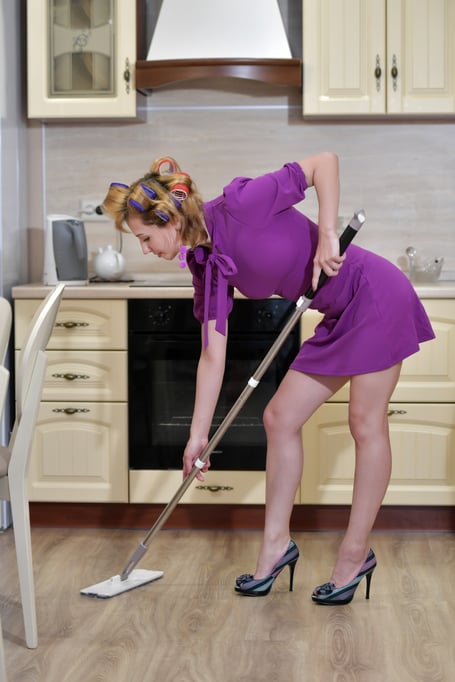A FEW weeks ago, I wrote about words that had been added to the Cambridge Dictionary. One was “tradwife”, which could be loosely defined as a young woman who chooses to embody the traditional idea of a stay-at-home mother and housewife, and posts idyllic imagery of the experience on social media. The movement has gained significant traction, with influencers amassing millions of followers.
I laughed at the very idea, as would you if you could see my home. I tick the stay-at-home box, but that’s half the problem – I’ve never been especially houseproud. The Other Half is considerably more organised than I am, and despairs at the semi-chaos; I point out that just because I’m at home, doesn’t mean I’m “free” to do all the housework.
I often find myself thinking: wouldn’t it be great if I didn’t have to go to work? I could just drop my news agenda and do the washing up/vacuuming/whatever tedious chore beckons. Housework is never so appealing as when you really should be doing something else.
Last week, some interesting news landed in my inbox. Researchers at King’s Business School in London argue that the tradwife phenomenon is less about glamourising the male-breadwinner female-caregiver model, than a plea for balance between our professional and personal lives.
The survey canvassed 1,000 young women aged between 18-34. Most participants were progressive in their views, but desperate for some let-up from the daily grind. They craved simplicity, leisure and escape from the pressures of increasingly demanding yet insecure work offering little space for family life.
You know how they say some women want to “have it all”? Well, having it all can be exhausting. You spend your daytime hours earning a crust and climbing the greasy pole, then come home to negotiate cooking and parenting before collapsing into bed. Sleep, rinse, repeat.
Over the past couple of years, I’ve discovered some of these things have names. Daughter is studying sociology GCSE, and will tell me about “double shifting”, the scenario described above; and “triple-shifting”, created by adding emotional labour - caring for the emotional needs of children and other family members - to the equation. This will be familiar to members of the sandwich generation, dividing themselves between the needs of teens and ageing parents.
The idea that men “have it all”, however, doesn’t quite compute – and it’s not entirely their fault. According to a survey by Working Families, the UK’s national charity for working parents and carers, three-quarters of fathers would like to share parenting more equally with their spouses, but their employers haven’t caught up with the times. Half are nervous to request time off for family matters; one-fifth said their bosses were labouring under the impression that this was their partner’s role. That is truly depressing.
There are definitely times when I can understand why work was split two ways in the past. Maintaining a home is often a full-time job, and shouldn’t be underestimated as something women can just bolt onto part-time employment.
And yet, over the past decade or so, it has been government policy to actively encourage, if not actually force women back into the workplace as soon as possible after having children. But you’re on a hiding to nothing without a corresponding change in societal attitudes. So many mothers wind up leaving the labour market - and often without a working partner to plug the financial gap - not out of choice, but due to inflexible working hours or a lack of affordable childcare.
The bottom line, according to report authors, is that the tradwife phenomenon could be used as justification to go back to the old ways. Shiyu Yuan, research assistant at King’s Global Institute for Women’s Leadership, said: “Many younger women engaging with tradwife content may have little historical awareness of the realities faced by women in eras when financial dependence left them vulnerable - without legal or economic power, and often trapped in relationships marked by inequality or even domestic abuse.
"Forgetting this history risks romanticising a past that, for many women, was neither safe nor empowering.”
And Professor Heejung Chung, director of the Global Institute for Women’s Leadership, describes the tradwife trend as “a warning sign” rather than evidence of a return to old-fashioned family values.
“Younger women are struggling to reconcile impossible demands,” she said. “They are signalling frustration with workplaces that still expect full devotion to work, while family responsibilities remain largely unchanged and shouldered by women.
“If not properly responded to, we risk pushing an entire generation of women toward authoritarian visions of family that promise escape from impossible choices, whilst in reality, restricts women’s hard-earned autonomy."
Handmaid’s tale, here we come? I really hope not. Perhaps the current government could add this to its never-ending, ever-increasing to-do list, which might then resemble my own.





Comments
This article has no comments yet. Be the first to leave a comment.